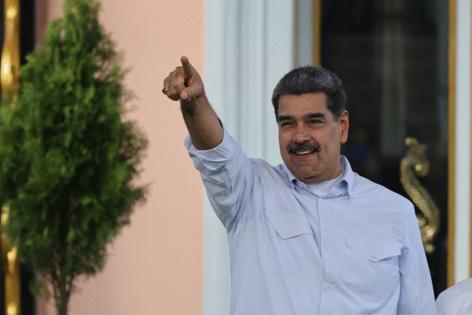Grenada weighs US radar proposal linked to anti-drug campaign targeting Venezuela
Published in News & Features
The government of Grenada said Thursday it is “carefully reviewing” a request by the Trump administration to deploy radar and other equipment on its territory.
The confirmation from the Ministry of Foreign Affairs comes after local media reported that such a request had been made by the United States, which has ramped up its presence in the southern Caribbean — allegedly to target drug cartels operating from Venezuela.
“The Ministry of Foreign Affairs, Trade and Export Development confirms that a request for the temporary installation of radar equipment and associated technical personnel at the Maurice Bishop International Airport was received from the Government of the United States of America,” the statement said.
The ministries of National Security, Legal Affairs, and Foreign Affairs “are carefully assessing the request and reviewing it in technical consultations, in coordination with the Grenada Airports Authority and other relevant agencies,” the government added.
“At this stage, the Government of Grenada is carefully reviewing the request in accordance with established national procedures. Any decisions will be made only after all technical and legal assessments are completed,” the statement noted.
The announcement from Grenada comes amid growing signs that the U.S. is considering launching land operations inside Venezuela to disrupt drug cartel activities within the South American country. The request to Grenada stands out because Trinidad and Tobago, which is closer to Venezuela, has said that it would cooperate with Washington if it were to ask. The country’s prime minister, Kamala Persad-Bissessar, has been vocal of her endorsement of U.S. efforts in the Caribbean Sea and recently met with Secretary of State Marco Rubio on the sidelines of the United Nations General Assembly.
U.S. forces have already targeted several boats allegedly smuggling narcotics from Venezuela through the Caribbean. The Pentagon said those operations destroyed at least five vessels and left 21 people dead. The strikes have fueled speculation that a broader military intervention in Venezuela could be on the horizon.
“Now we’ll look at cartels,” Trump told reporters at the White House last week. “We’re going to look very seriously at cartels coming by land.” He added that since U.S. forces began targeting drug-trafficking boats, “we have absolutely no drugs entering our country by water, because they were lethal.”
Trump’s comments align with recent media reports suggesting the administration is reviewing plans for targeted operations inside Venezuela. NBC News reported that options under consideration include drone strikes on cartel figures and clandestine drug labs. While no final decision has been made, officials say potential actions could begin “within weeks.”
Venezuela has already warned its Caribbean neighbors that it would retaliate if they support the U.S. military in any hostile actions.
Speaking last month in a video posted on social media, Venezuelan Defense Minister Vladimir Padrino López warned neighboring Guyana and Trinidad and Tobago not to allow the U.S. to drag them into an armed conflict.
“I tell these governments... that if we are attacked from their territory, they will also receive a response, and that is in legitimate defense,” Padrino declared in a video shared on his Telegram channel.
Padrino also accused Washington of sharply intensifying aerial surveillance of Venezuela, citing a surge in spy flights last month. “Now they moved from a daytime pattern to doing it at night and at dawn, and tripled in August the intelligence and reconnaissance operations against Venezuela,” he said.
Tensions between Washington and Caracas have been rising in recent weeks amid one of the largest U.S. military deployments in the Caribbean in decades. Warships, surveillance aircraft, amphibious vessels and even a nuclear-powered submarine have been stationed off Venezuela’s northern coast. Although U.S. officials insist the mission is focused on drug interdiction, critics argue it also serves as a show of force against the Nicolás Maduro regime.
Washington has long accused Maduro and senior officials of leading the so-called "Cartel of the Suns," a shadowy network allegedly embedded within Venezuela’s military and intelligence services, responsible for trafficking cocaine to the United States. The Trump administration has labeled Maduro a “fugitive from American justice” and indicted him on charges of narco-terrorism.
Maduro has categorically denied the allegations and has signed a decree activating a state of emergency in the event of foreign aggression. Venezuelan officials condemned what they described as U.S. threats of an “imperialist invasion,” warning that military action could destabilize the region.
“Our goal is to ensure that the entire nation — every citizen — has the support and protection of all the forces of Venezuelan society to respond to any threat or attack against our country,” Maduro said in a televised address last week.
In total, approximately 4,500 Marines and sailors have been deployed, supported by a cruiser, several destroyers, and a Los Angeles-class attack submarine equipped with more than 400 missile tubes capable of precision strikes. Ten stealth F-35 fighter jets have been stationed in Puerto Rico, with the capability to neutralize Venezuela’s aging fleet of Sukhoi-30s and F-16s.
U.S. Marines have conducted joint exercises on the island, while Secretary of Defense Peter Hegseth and Chairman of the Joint Chiefs of Staff General Daniel Caine have made high-profile visits.
(McClatchy Washington Bureau reporter Emily Goodin contributed to this story.)
©2025 Miami Herald. Visit miamiherald.com. Distributed by Tribune Content Agency, LLC.







Comments